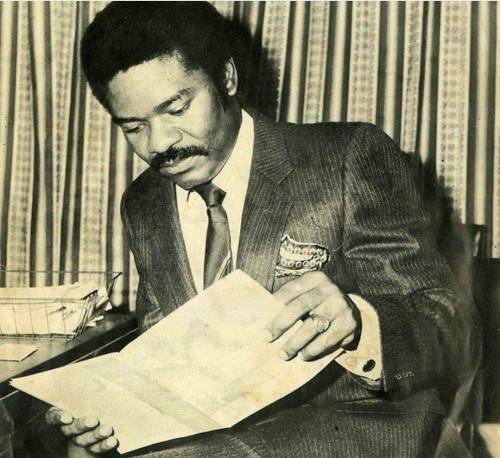Sumonu Oladele “Baines” Giwa popularly called Dele Giwa was born on March 16, 1947. He came from a very humble background. His poor family worked in the palace of Oba Adesoji Aderemi, who was the Ooni of Ife.
Dele Giwa’s father was a laundryman who paid his son’s school fees by washing the clothes of teachers at Oduduwa College in Ife, where Dele Giwa was editor of the school newspaper.
Giwa later traveled to New York in 1971, supporting himself by working in a plastic factory and driving taxi in his free time. He earned a degree in English from Brooklyn College. He later earned a master’s degree in public communications from Fordham University and worked as a news clerk for The New York Times.
He returned to Nigeria in 1979 and worked with two national newspapers, Daily Times and Sunday Concord. He incurred the government wrath after publishing a government report on the setting ablaze of a public building, the 37-story office of Nigerian external telecommunications, to hide embezzlement.
Between November 1982 and March 1983, Dele Giwa was arrested and jailed for a total of 14 days, had the charges against him dropped by the court and then reinstated by the police and was rearrested four times.
The government believes we’re dangerous, and therefore subterfuges are used to hold us in jail in the hope that we will be cowed into silence. They’re afraid of investigative journalism. – Dele Giwa
In 1984, he co-founded Newswatch with fellow journalists Ray Ekpu, Dan Agbese and Yakubu Mohammed.
On August 27, 1985, Ibrahim Badamasi Babangida came into power after a palace coup that ousted Muhammadu Buhari. Within the first year of his administration, Newswatch had a favourable view of the military ruler.
- The tune changed when the magazine exposed corruption in the government.
- Two weeks before Giwa’s death, the Newswatch cover story was titled: “Nigeria – Why Nothing Works.”
- Two days before Dele Giwa was killed, Giwa was called in by the intelligence agency for the fourth time in a year.
- Giwa was accused of plotting socialist revolution and importing arms into Nigeria, he denied both allegations.
After being interrogated by the director of the directorate of military intelligence (DMI), Brigadier General Akilu, and Colonel Tunde Togun, deputy director of the state security service (SSS), Mr Giwa briefed his lawyer Gani Fawenhinmi who is Nigeria’s leading human rights lawyer and also the country’s most imprisoned human rights activist.
Within a week Dele Giwa was blown up by a parcel delivered by a military dispatch rider on Sunday October 19, 1986. Mr Fawenhinmi accused Gen Babangida, Gen Akilu and Col Togun of the murder and began a private prosecution after the government’s initial reluctance to investigate the matter.

The police later took over the case but claimed to have no evidence or motive, and the presiding judge struck out the case without the accused ever setting foot in court.
A story published by TELL Magazine in 1993 claimed that the late human rights activist and lawyer Gani Fawehinmi who was Dele Giwa’s Lawyer “filed at least 32 cases and made 315 court appearances on the Dele Giwa’s issue.
Lagos newspapers continue a low-key campaign for years: In odd corners of their pages are little boxes that read, “who killed Dele Giwa ?“
The question “who killed Dele Giwa?” reminds us that justice delayed is justice denied. Denial of Justice, abuse of power, oppression of Press, disrespect for the rule of law is synonymous with Nigeria even till today.





















